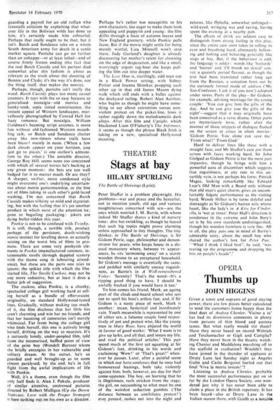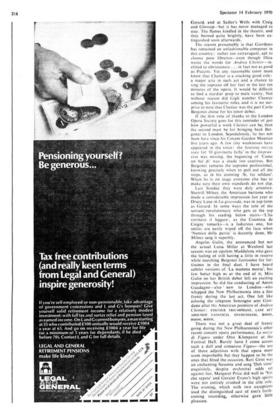OPERA
Thumbs up
JOHN HIGGINS
Given a tenor and soprano of good staying power, there are few pieces better calculated to send the customers home happy than the final duet of Andrea Chenier. Nicino a te' has had its dismissive comments in plenty from persons of thin blood and austere tastes. But what really would stir them? Have they never heard on record Wittrich and Teschemacher or Gigli and Caniglia? Have they never been in the theatre watch- ing Chenier and Maddalena marching off to the scaffold in exultation? Wouldn't they have joined in the thunder of applause at Drury Lane last Sunday night as Angeles Gulin and Carlo Bergonzi hurled out that final 'Viva la morte insiem!'?
Listening to Andrea Chenier, probably the most successful performance put on so far by the London Opera Society, one won- dered just why it has never been able to claim a place in the British repertory. It has been heard—also at Drury Lane in the Italian season there, with Guelfi as a notable
Gerard, and at Sadler's Wells with Craig and Glossop—but it has never managed to stay. The flames kindled in the theatre, and they burned quite brightly, have been ex- tinguished soon afterwards.
The reason presumably is that Giordano has remained an unfashionable composer in this country : rather too extravagant, apt to
choose poor librettos—even though Illica wrote the words for Andrea Chenier—in- dined to obviousness ... in fact not as good as Puccini. Yet any reasonable tenor must know that Chenier is a cracking good role:
a major aria in each act and a chance to sing the soprano off her feet in the last ten minutes of the opera. It would be difficult to find a sturdier prop to male vanity. Not without reason did Gigli number Chenier aniong his favourite roles, and it is no sur- prise to note that Chenier was the part Carlo Bergonzi chose for his tenor debut.
If the first vote of thanks to the London Opera Society goes for this reminder of just how powerful a work Chenier can be, then the second must be for bringing back Ber- gonzi to London. Scandalously, he has not been here since his Covent Garden Manrico five years ago. A few tiny weaknesses have appeared in the voice: the luscious mezza voce for '0 giovinetta bella' in the Improv- viso was missing, the beginning of 'Come un bel di' was a shade too cautious. But Bergonzi remains the supreme professional, knowing precisely when to pull out all the stops, as in his stunning Si, fui soldato'. When he is on stage everyone else has to make sure their own standards do not slip.
Last Sunday they were duly attentive. Sherrill Milnes, the American baritone who made a considerable impression last year at Drury Lane in La gioconda, was in top form as Gerard. In some ways the role of the servant/revolutionary who gets to the top through his reading below stairs—'L'ha rovinato it leggere', as the Countess de Coigny remarks—is a ludicrous one, but smiles are easily wiped off the face when `Nemico della patria' is decently done. Mr Milnes sang it superbly.
Angeles Gulin, the announced but not the actual Luisa Miller at Wexford last season, was an opulent Maddalena who gave the feeling of still having a little in reserve while matching Bergonzi fortissimo for for- tissimo in the final duet. I have heard subtler versions of 'La mamma morta', but few better high Bs at the end of it; Miss Gulin on her British debut left an exciting impression. So did the conducting of Anton Guadagno—also ' new to London—who whipped the New Philharmonia into a fine frenzy during the last act. One felt like echoing the telegram Sonzogno sent Gior- dano after the American premiere of Andrea Chenier: CHENIER TRIUMPHANT. LAST ACT AROUSED' FANATICAL ENTHUSIASM. BOOM, BOOM, BOOM.
There was not a great deal of frenzy going during the New Philharmonia's other recent concert opera performance, Le nozze di Figaro under Otto Klemperer at the Festival Hall. Rarely have I come across such a dull and comatose Figaro—the use of those adjectives with that opera must seem improbable but they happen to be the ones that fitted the occasion. Reri Grist was an enchanting Susanna and sang `Deh vieni' exquisitely, despite orchestral odds set against her, Margaret Price did well in `Vol the sapete' and Geraint Evans's high spirits were not entirely crushed in the title role. The evening, which with two exceptions used the distinguished cast of EMI'S forth- coming recording, otherwise gave little pleasure.



































 Previous page
Previous page